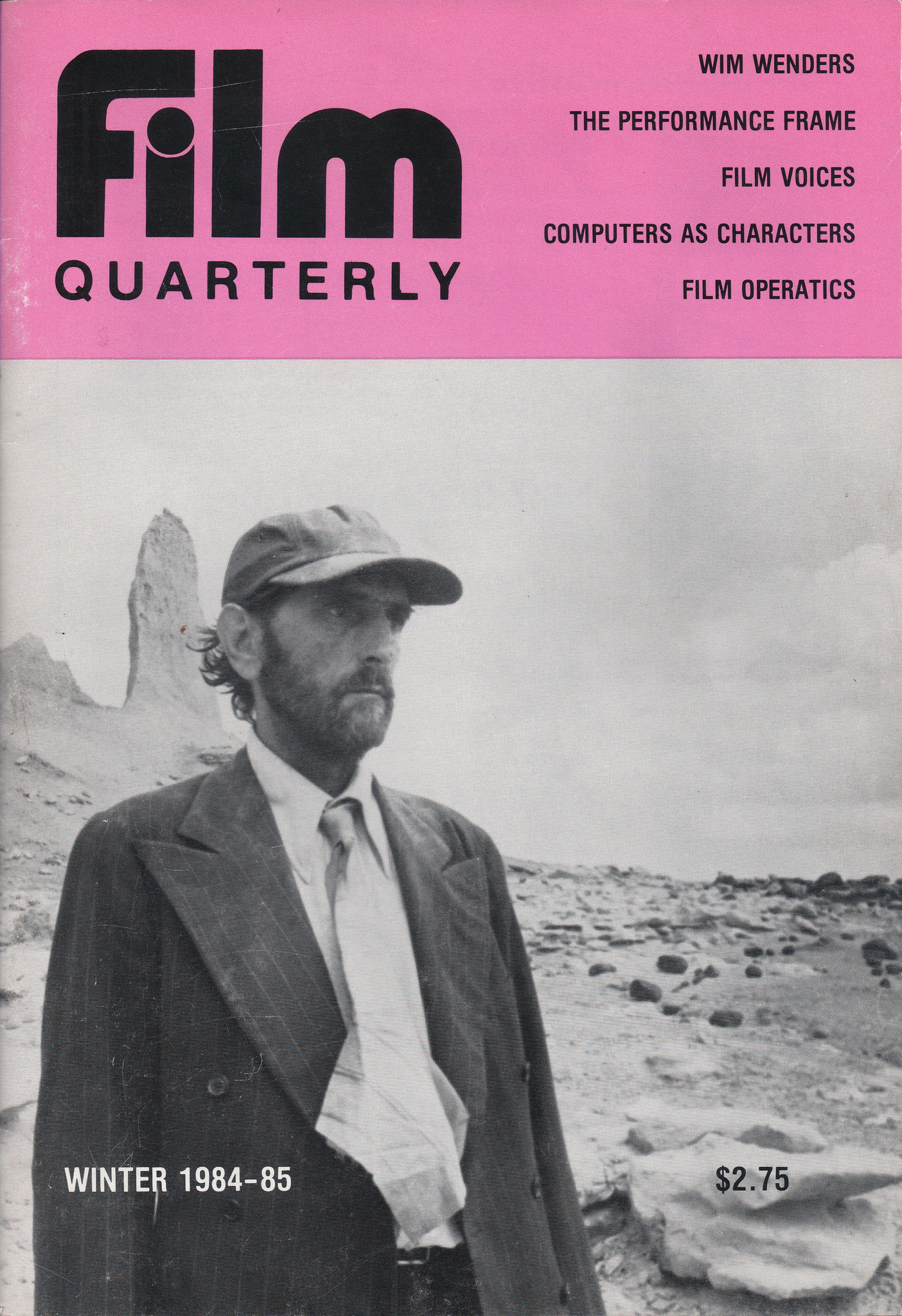Alexa here with your curio of the week. Wim Wenders' seminal film Paris, Texas was released 30 years ago, and over time it has become one of my all-time favorite films. So this week I thought I'd dig into my old magazine stash and share this 1984 issue of Film Quarterly that I scored at an estate sale awhile back. It includes a fascinating interview with Wenders, who discusses his "American period" and how its past failures (including Hammett) in may ways resulted in his success with Paris, Texas. Here are some selected quotes from the great philosophical meanderer.

On casting Harry Dean Stanton:
We chose Harry Dean because he...is one of the few adults I know who...has kept the child that's dead in most adults, and certainly a lot of actors, with him. He has an innocence about him, despite a long career and being 58 years old. In Paris, Texas he and Hunter change roles: sometimes you find Travis in the position of the child and his son as he adult.
On the structure of the narrative:
That's what made me like the story, the direction from the beginning - a very straight line. For once I was making a movie that wasn't meandering all over the place. That's what Sam [Shepard] brought to this movie of mine as an American writer: forward movement, which is very American in a way. I've always liked that movement and have always found myself incapable of doing it. Even with American Friend. I thought, "Great, we have this story by Patricia Highsmith, it's going to take us somewhere." But it never did. It went sideways, all over the place.
On its view of place:
Houston is more the opposite image to the desert in the beginning. With LA we tried to make it look like any Midwestern city - just nowhere. One thing about Paris, Texas from beginning to end - and this was true for each and every shot - was that we never thought of anything we'd seen before...Of course there's a certain amount of imagery that has passed into the subconscious, and the very second you have a frame and your'e shooting, either in the desert or the city, it would be pretentious to say this is something that hasn't been done before. We always tried to see just what was there and find a way to show it that corresponded to what was in front of us, not some notion of what we were reminded of.
On Nastassja Kinski:
My first idea for the part was her and...I never had any other idea for it. It has to do with a subtext in the movie, which is a man insisting on a certain image of a woman. And I felt Nastassja was so right for this movie because people who come to see it will prepare to see an image of her that's been made. In a way they must go through the same thing Travis goes through. That's how the peepshow came up: Travis is sitting in front of a screen, and she's on the screen, or behind it, and is really the object of his imagination. I've followed Nastassja's career and seen her films and some of them were painful to me because I felt there was someone who was trapped. There's a really great actress, and she's totally exploited because of her image. That was also a reason to ask her, because I felt she was waiting to show the other side of that image. And she did.
On how Hammett, Lightning Over Water and The State of Things resulted in Paris,Texas:
I couldn't have considered making Paris, Texas without any of those dead ends before. Because each and every one of those movies at the end led to a point where you can only return and say "This was not the way out." Each for its own reasons. And all of them were movies. It was not like starting with a different material - it was still a camera and film and an effort to believe in fiction...Reality...doesn't matter...I see lots of movies and was getting frustrated not only by my own work and the reflexiveness of it but with other movies, too, because it seemed there was no more way out. Whatever film you went to see, it had its nourishment or its life or its food, its roots, in other movies. In movies, I didn't see anything anymore that was really trying to redefine a relation between life and images made from life...And I think that's a really serious dead end for something that I love very much, which is movies. And I did my share of that. Paris,Texas was - I wouldn't say desperate, because it wasn't so desperate while I was making it - but at the end of The State of Things, there was no other chose than to redefine, or find again, or rediscover what this is: to film something that exists, and film something that exists quite apart from movies.